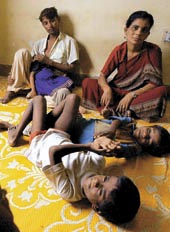 |
| Life at stake: HIV-infected children in New Delhi. Will the new rules on patents make their medication more expensive? AFP |
It?s a single word tucked within a long document that outlines amendments to India?s patent laws, but it has activists worried about its possible impact on the cost of medicines. It?s the word ?mere?.
As the deadline for India to comply with its commitments under the international Trade and Intellectual Property Rights (TRIPS) agreement to change its patent laws draws near, opposition to the amendments has intensified. Health activists are claiming that the government may be giving away more than is actually required under the TRIPS agreement and may harm patients? access to affordable medicines not just in India but elsewhere too.
Those campaigning for affordable medicines say that the proposed amendments go beyond TRIPS and, instead, open up what they call a ?TRIPS plus? regime.
It?s essentially like this. Indians had hitherto been free to ?copy? new and expensive drugs from the developed world, breaking them down in a process that came to be known as ?reverse engineering?, studying what went into them and then coming up with cheaper substitutes composed of the same ingredients. That way, the pharmaceutical industry saved itself the enormous cost of research and development ? and the drugs they made became more affordable for the poorer world. Under existing Indian patent laws, a drug cannot be patented. Only the process to make the drug is patentable.
But under the TRIPS agreement, India has to introduce product patents on drugs by January 1, 2005. While product patents on life-saving medicines is itself still a contentious issue, the current campaign is focused on the proposed amendments which, activists say, contain provisions not demanded by TRIPS. One of the proposed changes is the addition of a single word ?mere? to a section of the Patents Act that defines what kind of inventions are indeed patentable. Today, the law says that no new use of an old product is patentable. Under the amendment, ?mere? new use will not be patentable. That?s a clever way of saying that some new uses of old products can be patented. Public health activists are worried that this would allow companies to acquire patents on new uses or even new doses of known medicines.
?There are historical precedents in which new uses have been found for old drugs,? says K. Gopakumar, an activist with the Affordable Medicines and Treatment Campaign of Lawyers Collective, a law firm based in Mumbai in the vanguard of the campaign in India.
Independent experts on drugs concede that the addition of the word ?mere? could be used to the advantage of the innovator. But they also point out that the majority of Indian drug companies have long profited by finding new ways to produce molecules discovered by foreign companies. As a top Indian drug company official pointed out at a recent industry meeting in New Delhi: ?How long do we want to be known as reverse engineers and copycats??
Representatives of Lawyers Collective, the Affordable Medicines Treatment Campaign and other health organisations staged a protest in New Delhi last week demanding that the government reconsider the proposed amendments to the law. International members of the campaign also staged a simultaneous protest in front of the Indian embassy in Paris. ?The proposed changes in the Indian patent laws may affect patients elsewhere in the world,? said a representative of Medicins Sans Frontieres (MSF) who was at the protest meeting in New Delhi. He said the MSF is currently providing anti-HIV drugs to 25,000 patients in Africa and other developing countries for whom a significant proportion of drugs come from Indian manufacturers and cost far less than other medicines from Europe and the US.
Another amendment will dilute opportunities to oppose patent applications. Under the existing patent laws, once a patent has been accepted by the controller of patents, any individual or company can oppose the patent on various grounds. For instance, what was claimed to be an invention may already have been in the public domain, or have been published in a journal, or may not be a genuine innovation.
?Under the proposed amendment, an interested party could file a ?representation? to the controller of patents, but would not be able to be a party to the proceedings,? said Anand Grover, director of Lawyers Collective. The decision on the patent would then be entirely between the controller of patents and the company or individual staking a claim on the patent. The amendments would allow interested parties to oppose a patent once it has already been granted. But health sector workers say that even six months of sales in the market could allow companies to reap huge profits.
However, independent drug industry analysts point out that the process of opposition can be abused in the absence of a fast-track system for dealing with objections to patents. ?Opposition based on unsubstantiable claims would only delay patents without justification,? said Dr Chandra Gulhati, editor of the Monthly Index of Medical Specialities. And laws provide for no effective punishment for those who make frivolous objections. There lies the danger.










